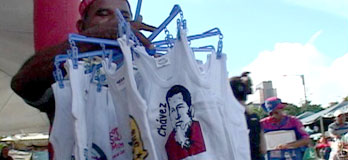Our intrepid reporters take a spin around the globe to see what the world has to say about America.

UPDATE: December 2008 - Over the past few months, the situation in Afghanistan has worsened with increased attacks on Afghan citizens and the U.S. military. President-elect Obama has said that stabilizing Afghanistan is one of his top priorities when he takes office in January 2009. Earlier this year, producer Gregory Warner spent several months in Afghanistan reporting for NPR programs like This American Life and Marketplace, among others. For POV's Borders, he spoke with a number of Afghans about their thoughts on the United States, the U.S. military and the American people. Watch the video
"You have come with this word that we will 'change' Afghanistan; it will be a new country. So do it."
— Yasamin, education student in Kabul
June 2006 - Don't knock the Cold War, it had its advantages. At least when the going got rough, world observers had a choice of superpowers to blame: big bad U.S. or big bad USSR But now, after the fall of the Soviet Union and with only one superpower left standing, there's only one nation that is all-powerful enough to be responsible when geopolitics go askew.
An escalating conflict in Iraq that smells more like civil war every day. Images of prisoners tortured by American soldiers in Abu Ghraib. Rumors of the mistreatment and abuse of detainees held at Guantanamo Bay. The Bush administration's post 9/11 foreign policy has ignited world debate over whether the U.S. is a hero- or a bully-nation, and not just among Muslims who resent the U.S. meddling in the Middle East.

A t-shirt vendor at an open-air market in Caracas, Venezuela, February 2006.
And the war on terror isn't the only reason why world observers are crying foul at the U.S. — there are also those who believe that the Bush administration's take on global warming — that it doesn't really exist — is dangerous folly; those that maintain that greed for oil is the only subtext for American foreign policy; and those in poor countries with high rates of HIV infection that feel that white Americans simply don't care.
We've all seen the footage of world leaders supporting or decrying the U.S., but POV wanted to know what everyday people on the streets of four very different countries had to say about the only superpower, and its voters.
"I would really feel much safer if the American voter knew what he was doing, because [your ballot] dictates how we live."
— graduate student in Beirut
Lebanon has only recently broken free of nearly 30 years of occupation by Syria, a nation that the Bush administration has branded as one of the bad guys in the war on terror. But still, students in Beruit rail against the U.S. Several say that the American talk of peace and democracy is a thin disguise for lust for oil and war. Another shares that he's particularly concerned that Americans just don't get it: "What upsets and scares me is that naiveté of the American voter," he says. "I would really feel much safer if the American voter knew what he was doing, because [your ballot] dictates how we live."
In Africa, national debts, the HIV/AIDS pandemic, and security crises such as that in Darfur cripple a continent still recovering from 19th century imperialism. Even in South Africa, which in the post-apartheid era is now one of the freer nations on the continent, up to 20 percent of the adult population lives with HIV.
"The war in Iraq is 'definitely not cool'"
— youth in Johannesburg
On the streets of Cape Town, young people are cynical about the good things television tells them about the U.S. One fashionable Muslim girl says she likes Americans overall but wonders how she would be treated in the U.S., a young black man states that the war in Iraq is "definitely not cool", and another notes with irony that he has a hip cell phone, but he still lives in a shack.
On the streets of Caracas, Venezuela's capital, people are keenly aware of the rift between their maverick president Hugo Chavez and George W. Bush. While Washington's attention has been focused on trouble in Afghanistan, Iraq, and now Iran, ballsy Hugo Chavez has galvanized anti-American sentiment that has spread in South America. One man in a red convertible calls the U.S. "the greatest father in the world," but street vendors say that the U.S. is "bellicose," "ignorant," and "imperialist," and they take it personally: "I have been a victim of the neoliberalism and imperialism of the government of the United States," one man declares.
As these people tell us, U.S. policies affect the daily lives of ordinary people in corners of the world that might seem, to Americans, to be very remote. But imagine for a moment if the situation were reversed, and a distant government — say the Lebanese or South African prime minister and parliament — determined your income, your sense of security, and your health.
What do you think? Share your feedback on this story and the videos presented here.
Meghan Laslocky is a freelance writer living in Oakland, California.